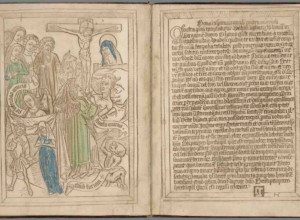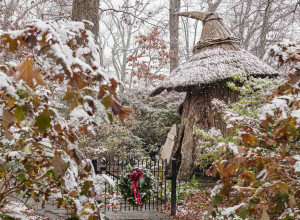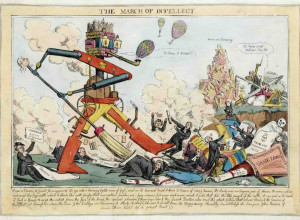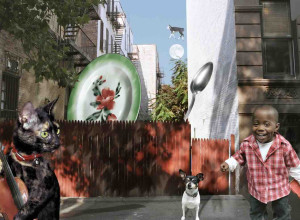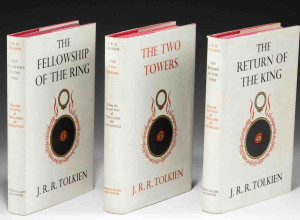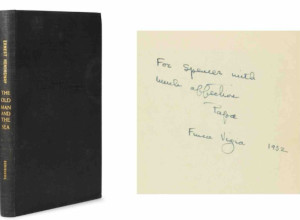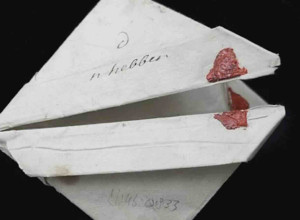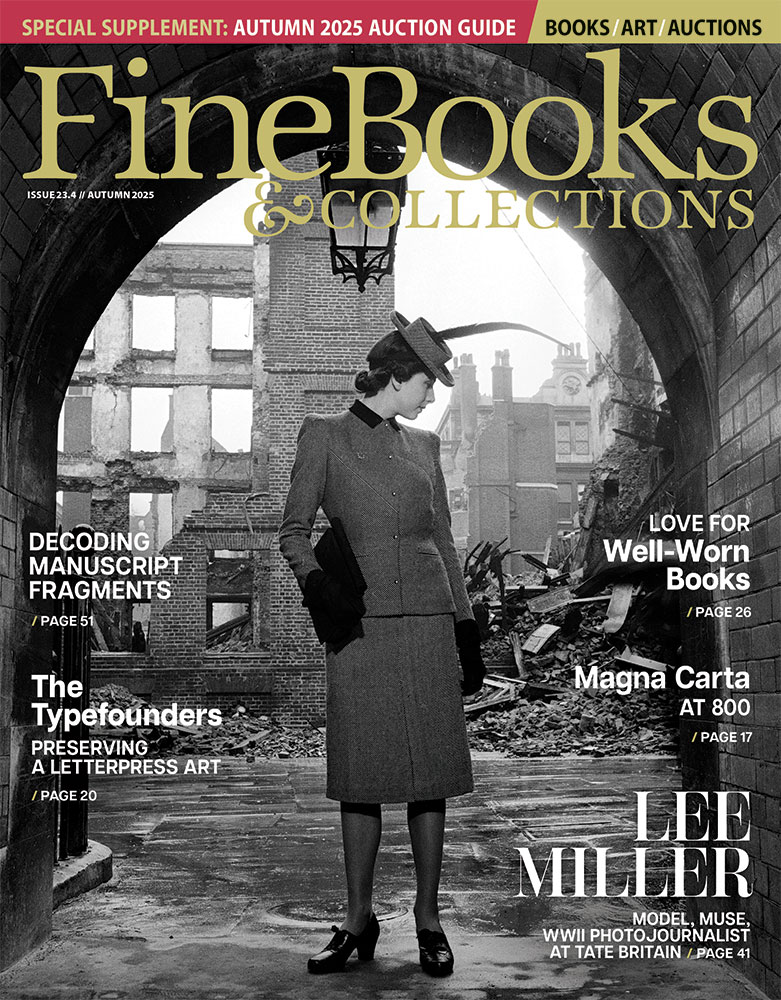Bright Young Librarians: Alex Johnston
Our series profiling the next generation of special collections librarians and curators continues today with Alex Johnston, the Senior Assistant Librarian in the Special Collections Library at the University of Delaware.


How did you get started in rare books?
When I was about half-way through my last year of undergrad at the University at Buffalo I was offered a student assistant position at the Poetry Collection, the University's special collections department. I had used the collection a few times to do research, so I had a general familiarity with them and their collections, but up until then it wouldn't really have crossed my mind that you could do that for a living. At the time I was working as a student assistant shelving books in the main library, so it seemed like an obvious choice to transfer there, if only because it would be the more interesting position. But I had no expectation at all that this would lead to a career move - I just thought it was going to be something interesting to do for a few months before I graduated. They initially hired me to work on their James Joyce collection, which was being recataloged by a scholar located in Ireland; I was basically to serve as the proxy between him and the originals. A lot of the initial work consisted of checking and correcting his descriptive catalog drafts against the originals; later they had me doing more involved things like original cataloging for some of the unprocessed materials. I quickly found that the material itself was so fascinating that even otherwise tedious things like basic proofreading were kind of elevated by the nature of what I was getting to work with. They have the world's biggest collection of Joyce materials, and I spent the better part of my time there working with their Ulysses material (manuscript notebooks, corrected page proofs, boxes and boxes of typescript drafts). I really enjoyed working with the materials and as I began to realize that this was something that you could actually do for a living, I opted to stick around to get a Masters degree. Having behind-the-scenes access to the whole of their collection made a big difference in terms of pushing me in that direction, too - that really helped open my eyes to this whole world. Their specialty is twentieth century poetry and they have been collecting in that area since the department was founded in 1937, so they have almost anything you could think of in that area. And the initial donation that had started their department was a collection, assembled in the earlier twentieth century, of all the highlights of English and American literature - Shakespeare folios, every Kelmscott Press book on paper and on vellum, etc. Added to all of that, the staff there were all incredibly enthusiastic about their work and the collection, so, being in that kind of atmosphere, that made a huge difference. After just a few weeks there it was pretty much clear that this is what I should be doing.
Where did you earn your MLS?
The MLS was at the University at Buffalo, the same place I did my undergraduate degree. I was able to keep working at the Poetry Collection while doing my Masters degree, which made for a really great practical education. In addition to the Joyce work, I kept picking up other responsibilities - a lot of cataloging projects with everything from sixteenth-century books to modern poetry, some exhibition work - so that by the time I graduated I had already about a year and a half of practical experience. Working there also allowed me to tailor my course work and assignments more towards a special collections track, and I tried to incorporate their collections into my assignments as much as possible.
What is your role at your institution?
I'm one of the rare books librarians in the Special Collections department. I do a lot of the behind-the-scenes work that goes into managing the rare book collection and making it available to researchers - selecting items for conservation, identifying things that need protective housing, sending things to and from the cataloging department, etc - and I work with the department head on the acquisitions and collection development process. One of the great things about our department is that, between budgets, friends groups, and donors, we're able to keep making significant additions to the collection, so there's always interesting new materials coming in. I'm also on a rotating exhibition schedule, where I'm responsible for curating the exhibition in our gallery, either on my own or with other co-curators. And I do a lot of user education sessions where classes will come in to see and work with special collections materials related to their coursework. Given the variety of collection materials, I can be teaching about anything from early printed books to science fiction pulp magazines to the history of science.
Favorite rare book / ephemera that you've handled?
It's hard to pick just one item, especially since our holdings cover so many different time periods and subjects. We have so many neat things in the collection that it's easy to lose track of them. It's always fun to see early editions or association copies of writers that I'm especially fond of, and I've long been especially partial to early printed books in general - I like the fact that, even though they're more or less mass-produced objects, each one is still unique, with its own story to tell. I'm especially fond of books that have some kind of history or human connection behind them. One that's always stood out was a 1535 Erasmus Bible that I worked with when I was a graduate student at the University at Buffalo. The book was interesting to me less for the text than for its marginalia and provenance. It had passed through ten different owners between 1550 and 1910, all of whom had signed and dated their names on the title page, usually with details of where they acquired the book, who they got it from, etc, so that you could trace the book's movements for nearly five hundred years. Every single page of the book was full of marginalia, in several different hands, such that the book probably contained more handwritten ink than printed ink. It was neat to be able to see the book not just as an artifact or a museum piece, but as something that people now long gone had been actively reading and studying and marking up. Another favorite, at Delaware, is a copy of Boswell's Life of Johnson that was owned by a contemporary of Johnson's, Dr. Cadogan. Cadogan knew all the people described in the book, and apparently he loathed them all, as he took the trouble to annotate his copy with lots and lots of vitriolic rants about everyone described in the book. And then, more comically, there was the copy of A Farewell to Arms at Buffalo that Ernest Hemingway had inscribed to James Joyce. Hemingway wanted Joyce to be able to read the unedited text, so he went through the book and handwrote in all of the expletives that the censors had deleted from the printed edition.
What do you personally collect?
I actually don't collect much anymore - I find that working in a library has kind of cured me of the habit. There's so much at hand here, between special collections and the circulating collection, that I don't really feel the need to. And at this point I find it much more rewarding to collect for an institution. The antiquarian books that I'm interested in have a much better home here than they would in my collection.
What excites you about rare book librarianship?
Every day I get to work with and learn from historic artifacts; I think that pretty much sums it up. There's an enormous amount of human history here, and there's always something new to see and learn about, and it's really rewarding to share that with others, whether through classes or exhibitions or working individually with researchers.
Thoughts on the future of special collections / rare book librarianship?
I think we've been seeing a continuing trend of encouraging use of special collection materials, which is a good thing. Particularly at UD we've been doing a lot to encourage use of the collection by undergraduates. (Although there's still an ongoing need to counter the long-running belief that special collections is a place full of expensive, fragile old books that no one is allowed to use.) Digitization is opening up a lot of opportunities to expand access to materials - what with fully digitized collections available online, as well as with services like our Digitization on Demand - for users who wouldn't otherwise be able to travel to the library to use materials on site. And at the same time I think we're seeing an increased interest in the rare book as physical artifact - all these things that we can learn from these materials as physical materials, things that you can't necessarily compress into a computer. There's certainly plenty of interest in our collections. I think we benefit from the fact that, for many people, our materials can be inherently of interest as physical artifacts, and that we're a place in the library where you're guaranteed to find things that you can't see anywhere else in the world. I think we're in an especially good position to stand out as what's unique about our institutions. So I think the profession is in an interesting position.
Any unusual or interesting collection at your library you'd like to draw our attention to?
We've got all kinds of great stuff here. The collecting areas are pretty broad here, so there's a great variety of things available. At the moment I'm working on selecting items for a natural history exhibition, so that's currently where my mind is. The early modern books from that collection are especially interesting, since you have accurate science mixed in with folklore, mythology, and hearsay. It's interesting to see how relatively accurate many of the volumes in that collection are, while still missing the mark now and again. And I just finished curating an exhibition on the Bird & Bull Press, and that's one definitely worth mentioning. For those not familiar, Bird & Bull Press was a fine press run by Henry Morris from 1958 to 2013. Most of his books were about different aspects of bookmaking and book arts, and for the most part these were either original texts or reprints of books that had been out of print for years. We have the entire archive of Bird & Bull Press, which is very extensive (something in the vicinity of 100 boxes of materials) and has manuscripts and artifacts documenting almost every book Henry Morris ever printed, so that the collection provides a really great, in-depth way to look at the operations of a fine press over a pretty long period of time. One of the latest installments for that archive consisted of the materials for the books that Henry Morris identified as his personal favorite productions - which is an interesting research source, and also made for a good thing to highlight in the exhibition.
Any upcoming exhibitions at your library?
The current exhibition is on William S. Burroughs (for the centenary of his birth), and that was installed just a few weeks ago. I didn't work on that one, myself, but its been interesting to see it going in. We have a pretty comprehensive collection of his works on display, and there's also a lot of stuff by his contemporaries there, too. After that, in the fall, we're doing an exhibition of materials from the natural history collection, and I'm currently working on selecting books for that one, as I mentioned earlier. There's a lot of great things in that area of the collection, spanning the sixteenth century to the present, so that's going to be a very interesting one to work on, especially since that collection has a lot of great visual items.






